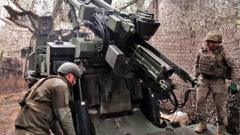The footage captured by drones reveals the grim reality on the ground, as artillery strikes underscore the fierce clashes that define this conflict. Officers and soldiers share their inner thoughts and emotions, reflecting on both the losses they have endured and the unresolved thirst for peace. For them, the stakes are personal and profound—beyond the political, they see the faces of comrades lost in this relentless struggle.
While hope flickers with the possibility of talks, the specter of further conflict looms large, as many still believe that the only resolution will come through unwavering resolve and defense of their homeland.
---
In a rural house modified into a command center, soldiers of the 155th mechanized brigade monitor live feeds from drones, observing the relentless fighting on the front lines of Pokrovsk. The air is thick with tension as Russian forces advance towards key routes, prompting Ukrainian artillery to respond with fierce strikes. One officer, identified by the call sign "Kozak," expresses that recent Russian interest in negotiations could signal a turning point, yet he remains skeptical. "Russia was the first to push for these talks, but I fear empty promises," he reflects.
The destruction surrounding Pokrovsk is stark; the toll of war has escalated since the conflict began. Civilians, including those like 37-year-old Yurii, with a prior life in technology, yearn for peace but acknowledge the deep wounds left by the invasion. "We must never forget we didn't start this war," he asserts, while neighboring soldiers coordinate artillery strikes against visible enemy movements.
Traveling through mud-clad tracks to reach artillery positions, the blend of old and new warfare technologies is apparent. French-made "Caesar" artillery units have become vital for the Ukrainian defense, enhancing effectiveness in the ongoing battle. Yet, as conflicts escalate, aerial threats from advanced drones add fear and uncertainty to daily operations.
Amidst the artillery fire and ongoing assaults, soldiers grapple with the idea of territorial concessions proposed in peace discussions. Yurii voices the pain of these potential compromises, while Kozak emphasizes that giving up land could ultimately lead to further conflict. The emotional scars of loss manifest in stories shared among the ranks, amplifying their determination to stand firm against aggression.
Back in Zaporizhzhia, a grieving mother, Yana, lays flowers by her son’s grave—her heart burdened by sorrow and frustration. The talk of peace feels hollow to her given the deep-seated violence and betrayal she associates with Russian occupation. "I hope my child did not die for nothing," she sobs, underscoring the chilling reality of personal sacrifice amidst a war where every loss weighs heavily on the hopes for a brighter future in Ukraine.
While hope flickers with the possibility of talks, the specter of further conflict looms large, as many still believe that the only resolution will come through unwavering resolve and defense of their homeland.
---
In a rural house modified into a command center, soldiers of the 155th mechanized brigade monitor live feeds from drones, observing the relentless fighting on the front lines of Pokrovsk. The air is thick with tension as Russian forces advance towards key routes, prompting Ukrainian artillery to respond with fierce strikes. One officer, identified by the call sign "Kozak," expresses that recent Russian interest in negotiations could signal a turning point, yet he remains skeptical. "Russia was the first to push for these talks, but I fear empty promises," he reflects.
The destruction surrounding Pokrovsk is stark; the toll of war has escalated since the conflict began. Civilians, including those like 37-year-old Yurii, with a prior life in technology, yearn for peace but acknowledge the deep wounds left by the invasion. "We must never forget we didn't start this war," he asserts, while neighboring soldiers coordinate artillery strikes against visible enemy movements.
Traveling through mud-clad tracks to reach artillery positions, the blend of old and new warfare technologies is apparent. French-made "Caesar" artillery units have become vital for the Ukrainian defense, enhancing effectiveness in the ongoing battle. Yet, as conflicts escalate, aerial threats from advanced drones add fear and uncertainty to daily operations.
Amidst the artillery fire and ongoing assaults, soldiers grapple with the idea of territorial concessions proposed in peace discussions. Yurii voices the pain of these potential compromises, while Kozak emphasizes that giving up land could ultimately lead to further conflict. The emotional scars of loss manifest in stories shared among the ranks, amplifying their determination to stand firm against aggression.
Back in Zaporizhzhia, a grieving mother, Yana, lays flowers by her son’s grave—her heart burdened by sorrow and frustration. The talk of peace feels hollow to her given the deep-seated violence and betrayal she associates with Russian occupation. "I hope my child did not die for nothing," she sobs, underscoring the chilling reality of personal sacrifice amidst a war where every loss weighs heavily on the hopes for a brighter future in Ukraine.



















